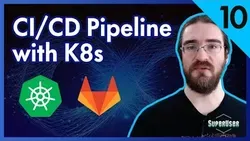
Kubernetes Package Administration with Helm

This course provides an introduction to Kubernetes package administration with Helm. It covers topics such as installing and configuring Helm, working with Helm releases, and managing Helm repositories, enabling users to become proficient in Helm administration.▼
Course Feature
![]() Cost:
Cost:
Free Trial
![]() Provider:
Provider:
Pluralsight
![]() Certificate:
Certificate:
Paid Certification
![]() Language:
Language:
English
![]() Start Date:
Start Date:
On-Demand
Course Overview
❗The content presented here is sourced directly from Pluralsight platform. For comprehensive course details, including enrollment information, simply click on the 'Go to class' link on our website.
Updated in [March 06th, 2023]
This course, Kubernetes Package Administration with Helm, is designed to provide learners with the foundational knowledge to manage Kubernetes packages with Helm. Learners will gain an understanding of how to set up their local environment to work with Helm, install and configure Helm, explore Helm releases, and manage Helm repositories. Topics covered include installing and configuring Helm, working with Helm releases, and managing Helm repositories. Learners will also learn how to deploy a Helm chart, upgrade the application running within a release, roll back that upgrade, explore Helm Charts, package a custom Helm Chart, push a custom Chart to a Helm repository, and create a remote Helm repository. Upon completion of this course, learners will have the skills and knowledge of Helm needed to manage Kubernetes packages.
[Applications]
Upon completion of this course, learners will be able to apply their knowledge of Helm to manage Kubernetes packages. Learners will be able to install and configure Helm, work with Helm releases, and manage Helm repositories. They will be able to deploy Helm charts, upgrade applications running within a release, roll back upgrades, explore Helm charts, package custom Helm charts, and push custom charts to Helm repositories. Learners will also be able to create remote Helm repositories and share their applications.
[Career Paths]
Recommended Career Paths:
1. Kubernetes Administrator: Kubernetes Administrators are responsible for managing and maintaining Kubernetes clusters. They are responsible for deploying and managing applications, monitoring and troubleshooting issues, and ensuring the security and performance of the cluster. With the knowledge gained from this course, Kubernetes Administrators can use Helm to easily deploy and manage applications on Kubernetes clusters.
2. DevOps Engineer: DevOps Engineers are responsible for automating and streamlining the software development process. They are responsible for setting up and maintaining the development, testing, and production environments, as well as deploying and managing applications. With the knowledge gained from this course, DevOps Engineers can use Helm to easily deploy and manage applications on Kubernetes clusters.
3. Cloud Engineer: Cloud Engineers are responsible for designing, building, and managing cloud-based systems. They are responsible for setting up and maintaining cloud-based infrastructure, as well as deploying and managing applications. With the knowledge gained from this course, Cloud Engineers can use Helm to easily deploy and manage applications on Kubernetes clusters.
4. Kubernetes Developer: Kubernetes Developers are responsible for developing applications that run on Kubernetes clusters. They are responsible for designing, building, and deploying applications, as well as managing and troubleshooting issues. With the knowledge gained from this course, Kubernetes Developers can use Helm to easily deploy and manage applications on Kubernetes clusters.
Developing Trends:
1. Automation: Automation is becoming increasingly important in the world of Kubernetes. Automation tools such as Helm make it easier to deploy and manage applications on Kubernetes clusters.
2. Cloud Native: Cloud Native technologies are becoming increasingly popular in the world of Kubernetes. Cloud Native technologies such as Helm make it easier to deploy and manage applications on Kubernetes clusters.
3. Security: Security is becoming increasingly important in the world of Kubernetes. Security tools such as Helm make it easier to deploy and manage applications on Kubernetes clusters in a secure manner.
4. Scalability: Scalability is becoming increasingly important in the world of Kubernetes. Scalability tools such as Helm make it easier to deploy and manage applications on Kubernetes clusters in a scalable manner.
[Education Paths]
Recommended Degree Paths:
1. Bachelor of Science in Computer Science: This degree path provides students with a comprehensive understanding of computer science fundamentals, including programming, software engineering, and data structures. It also covers topics such as artificial intelligence, machine learning, and cloud computing. This degree path is ideal for those looking to pursue a career in software engineering, data science, or cloud computing.
2. Master of Science in Cloud Computing: This degree path provides students with an in-depth understanding of cloud computing technologies, such as virtualization, distributed computing, and containerization. It also covers topics such as cloud security, scalability, and performance. This degree path is ideal for those looking to pursue a career in cloud computing, DevOps, or software engineering.
3. Master of Science in Data Science: This degree path provides students with a comprehensive understanding of data science fundamentals, including data mining, machine learning, and data visualization. It also covers topics such as artificial intelligence, natural language processing, and predictive analytics. This degree path is ideal for those looking to pursue a career in data science, analytics, or machine learning.
4. Master of Science in Artificial Intelligence: This degree path provides students with an in-depth understanding of artificial intelligence fundamentals, including robotics, computer vision, and natural language processing. It also covers topics such as machine learning, deep learning, and reinforcement learning. This degree path is ideal for those looking to pursue a career in artificial intelligence, machine learning, or robotics.
Course Provider





